Australian Prime Ministers: Factors Behind Leadership Changes
VerifiedAdded on 2023/06/14
|9
|2714
|456
Essay
AI Summary
This essay explores the significant factors contributing to the frequent changes in Australian Prime Ministers over the last decade, a period marked by considerable political instability. It identifies key social and political elements, including controversies surrounding policies on climate change, asylum seekers, and economic strategies, as pivotal in influencing leadership transitions. The analysis covers the tenures of five Prime Ministers—Kevin Rudd, Julia Gillard, Tony Abbott, and Malcolm Turnbull—highlighting specific policy decisions and events that led to their respective declines in popularity and eventual replacements. The essay also discusses the broader implications of these changes on Australian politics, including the impact on public policies, international relations, and public perception, arguing that the lack of long-term leadership has affected Australia's image on the global stage and created confusion among voters. Ultimately, it suggests that political stability and consistent leadership are crucial for Australia's future.
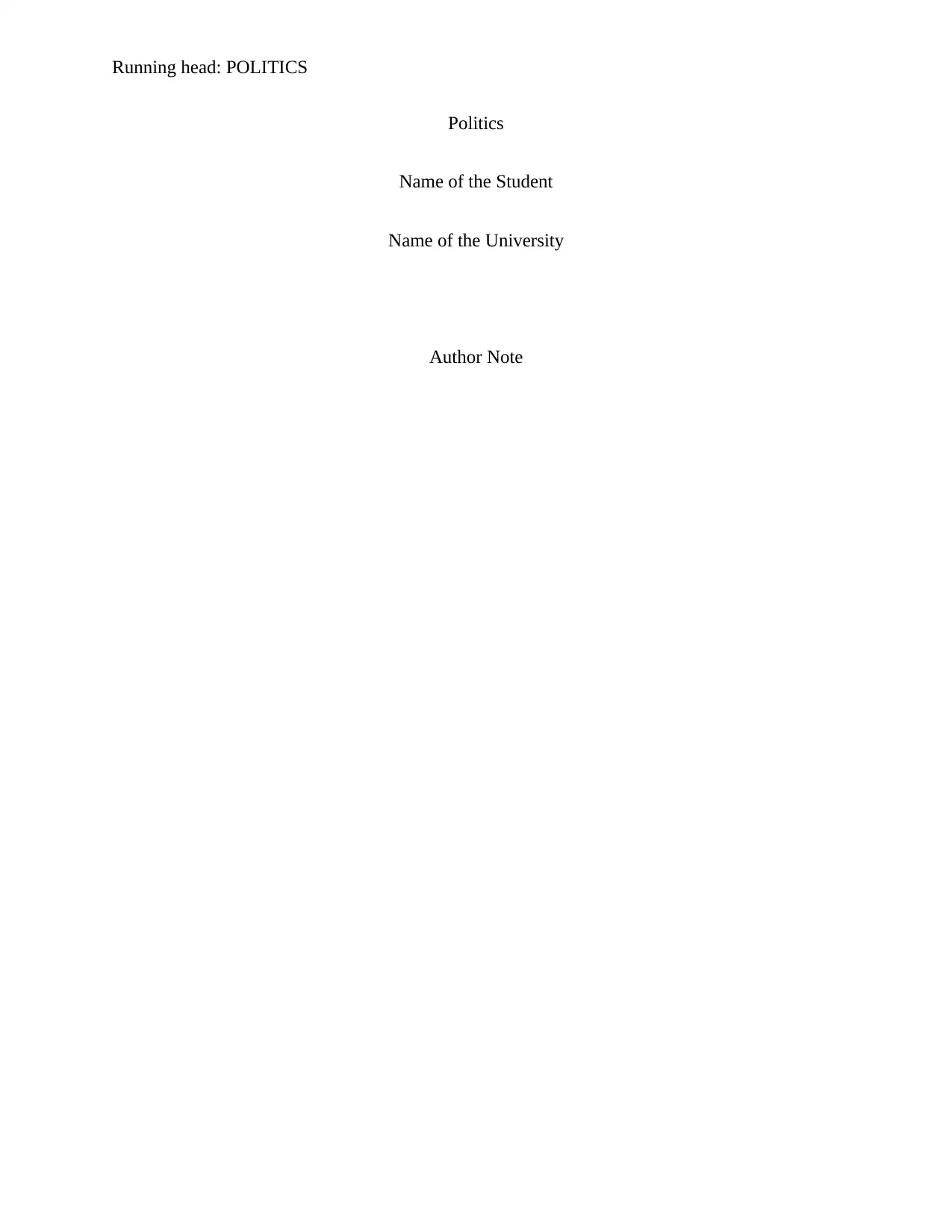
Running head: POLITICS
Politics
Name of the Student
Name of the University
Author Note
Politics
Name of the Student
Name of the University
Author Note
Paraphrase This Document
Need a fresh take? Get an instant paraphrase of this document with our AI Paraphraser
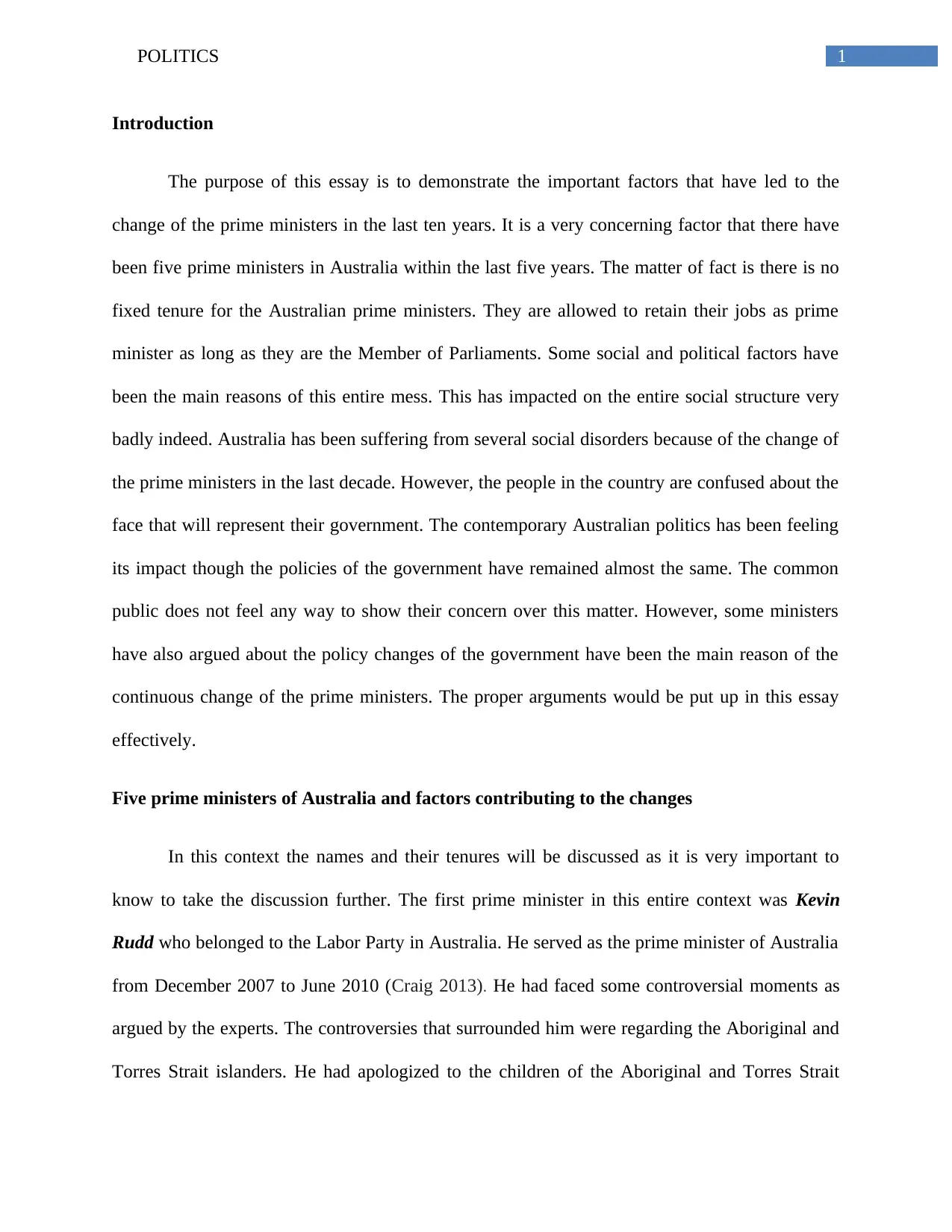
1POLITICS
Introduction
The purpose of this essay is to demonstrate the important factors that have led to the
change of the prime ministers in the last ten years. It is a very concerning factor that there have
been five prime ministers in Australia within the last five years. The matter of fact is there is no
fixed tenure for the Australian prime ministers. They are allowed to retain their jobs as prime
minister as long as they are the Member of Parliaments. Some social and political factors have
been the main reasons of this entire mess. This has impacted on the entire social structure very
badly indeed. Australia has been suffering from several social disorders because of the change of
the prime ministers in the last decade. However, the people in the country are confused about the
face that will represent their government. The contemporary Australian politics has been feeling
its impact though the policies of the government have remained almost the same. The common
public does not feel any way to show their concern over this matter. However, some ministers
have also argued about the policy changes of the government have been the main reason of the
continuous change of the prime ministers. The proper arguments would be put up in this essay
effectively.
Five prime ministers of Australia and factors contributing to the changes
In this context the names and their tenures will be discussed as it is very important to
know to take the discussion further. The first prime minister in this entire context was Kevin
Rudd who belonged to the Labor Party in Australia. He served as the prime minister of Australia
from December 2007 to June 2010 (Craig 2013). He had faced some controversial moments as
argued by the experts. The controversies that surrounded him were regarding the Aboriginal and
Torres Strait islanders. He had apologized to the children of the Aboriginal and Torres Strait
Introduction
The purpose of this essay is to demonstrate the important factors that have led to the
change of the prime ministers in the last ten years. It is a very concerning factor that there have
been five prime ministers in Australia within the last five years. The matter of fact is there is no
fixed tenure for the Australian prime ministers. They are allowed to retain their jobs as prime
minister as long as they are the Member of Parliaments. Some social and political factors have
been the main reasons of this entire mess. This has impacted on the entire social structure very
badly indeed. Australia has been suffering from several social disorders because of the change of
the prime ministers in the last decade. However, the people in the country are confused about the
face that will represent their government. The contemporary Australian politics has been feeling
its impact though the policies of the government have remained almost the same. The common
public does not feel any way to show their concern over this matter. However, some ministers
have also argued about the policy changes of the government have been the main reason of the
continuous change of the prime ministers. The proper arguments would be put up in this essay
effectively.
Five prime ministers of Australia and factors contributing to the changes
In this context the names and their tenures will be discussed as it is very important to
know to take the discussion further. The first prime minister in this entire context was Kevin
Rudd who belonged to the Labor Party in Australia. He served as the prime minister of Australia
from December 2007 to June 2010 (Craig 2013). He had faced some controversial moments as
argued by the experts. The controversies that surrounded him were regarding the Aboriginal and
Torres Strait islanders. He had apologized to the children of the Aboriginal and Torres Strait
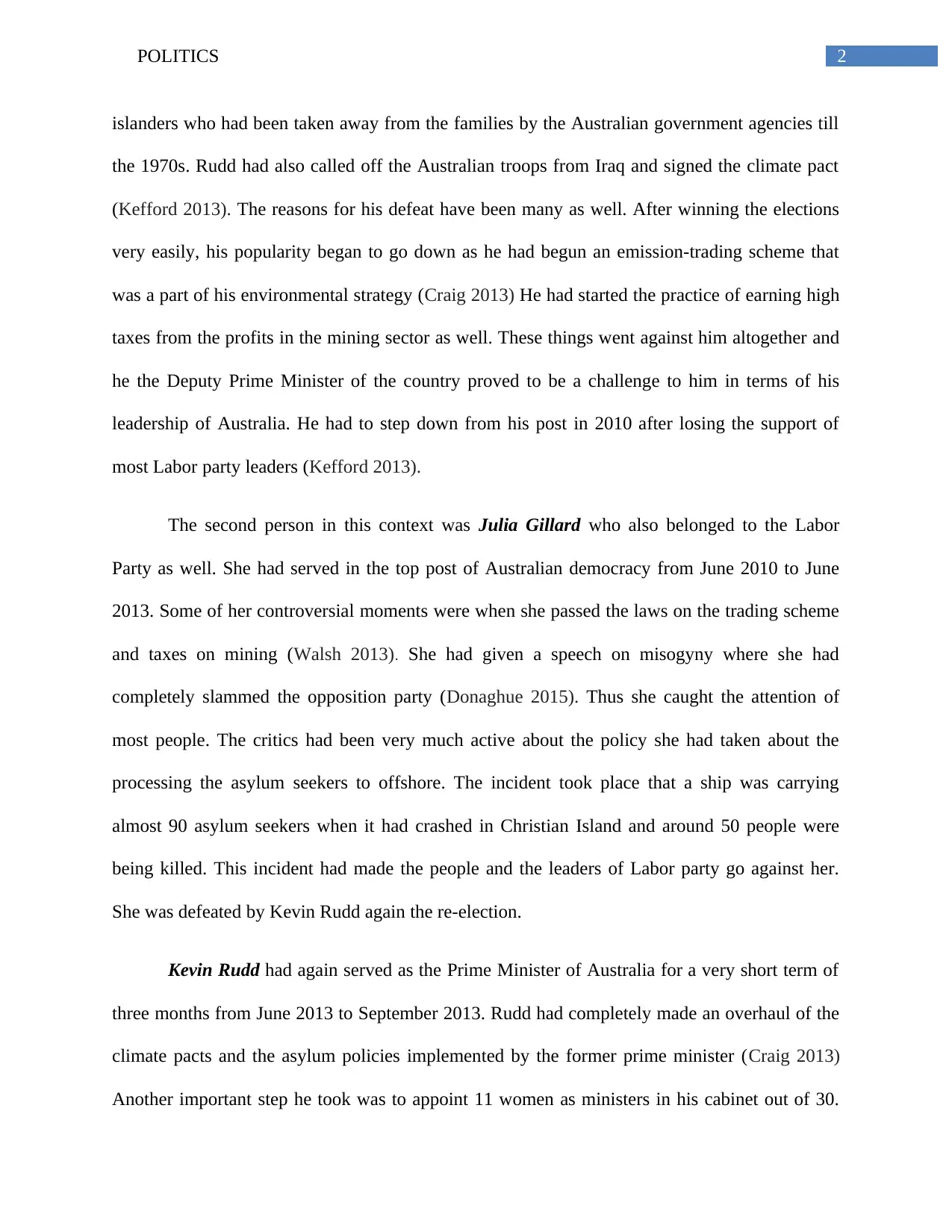
2POLITICS
islanders who had been taken away from the families by the Australian government agencies till
the 1970s. Rudd had also called off the Australian troops from Iraq and signed the climate pact
(Kefford 2013). The reasons for his defeat have been many as well. After winning the elections
very easily, his popularity began to go down as he had begun an emission-trading scheme that
was a part of his environmental strategy (Craig 2013) He had started the practice of earning high
taxes from the profits in the mining sector as well. These things went against him altogether and
he the Deputy Prime Minister of the country proved to be a challenge to him in terms of his
leadership of Australia. He had to step down from his post in 2010 after losing the support of
most Labor party leaders (Kefford 2013).
The second person in this context was Julia Gillard who also belonged to the Labor
Party as well. She had served in the top post of Australian democracy from June 2010 to June
2013. Some of her controversial moments were when she passed the laws on the trading scheme
and taxes on mining (Walsh 2013). She had given a speech on misogyny where she had
completely slammed the opposition party (Donaghue 2015). Thus she caught the attention of
most people. The critics had been very much active about the policy she had taken about the
processing the asylum seekers to offshore. The incident took place that a ship was carrying
almost 90 asylum seekers when it had crashed in Christian Island and around 50 people were
being killed. This incident had made the people and the leaders of Labor party go against her.
She was defeated by Kevin Rudd again the re-election.
Kevin Rudd had again served as the Prime Minister of Australia for a very short term of
three months from June 2013 to September 2013. Rudd had completely made an overhaul of the
climate pacts and the asylum policies implemented by the former prime minister (Craig 2013)
Another important step he took was to appoint 11 women as ministers in his cabinet out of 30.
islanders who had been taken away from the families by the Australian government agencies till
the 1970s. Rudd had also called off the Australian troops from Iraq and signed the climate pact
(Kefford 2013). The reasons for his defeat have been many as well. After winning the elections
very easily, his popularity began to go down as he had begun an emission-trading scheme that
was a part of his environmental strategy (Craig 2013) He had started the practice of earning high
taxes from the profits in the mining sector as well. These things went against him altogether and
he the Deputy Prime Minister of the country proved to be a challenge to him in terms of his
leadership of Australia. He had to step down from his post in 2010 after losing the support of
most Labor party leaders (Kefford 2013).
The second person in this context was Julia Gillard who also belonged to the Labor
Party as well. She had served in the top post of Australian democracy from June 2010 to June
2013. Some of her controversial moments were when she passed the laws on the trading scheme
and taxes on mining (Walsh 2013). She had given a speech on misogyny where she had
completely slammed the opposition party (Donaghue 2015). Thus she caught the attention of
most people. The critics had been very much active about the policy she had taken about the
processing the asylum seekers to offshore. The incident took place that a ship was carrying
almost 90 asylum seekers when it had crashed in Christian Island and around 50 people were
being killed. This incident had made the people and the leaders of Labor party go against her.
She was defeated by Kevin Rudd again the re-election.
Kevin Rudd had again served as the Prime Minister of Australia for a very short term of
three months from June 2013 to September 2013. Rudd had completely made an overhaul of the
climate pacts and the asylum policies implemented by the former prime minister (Craig 2013)
Another important step he took was to appoint 11 women as ministers in his cabinet out of 30.
⊘ This is a preview!⊘
Do you want full access?
Subscribe today to unlock all pages.

Trusted by 1+ million students worldwide
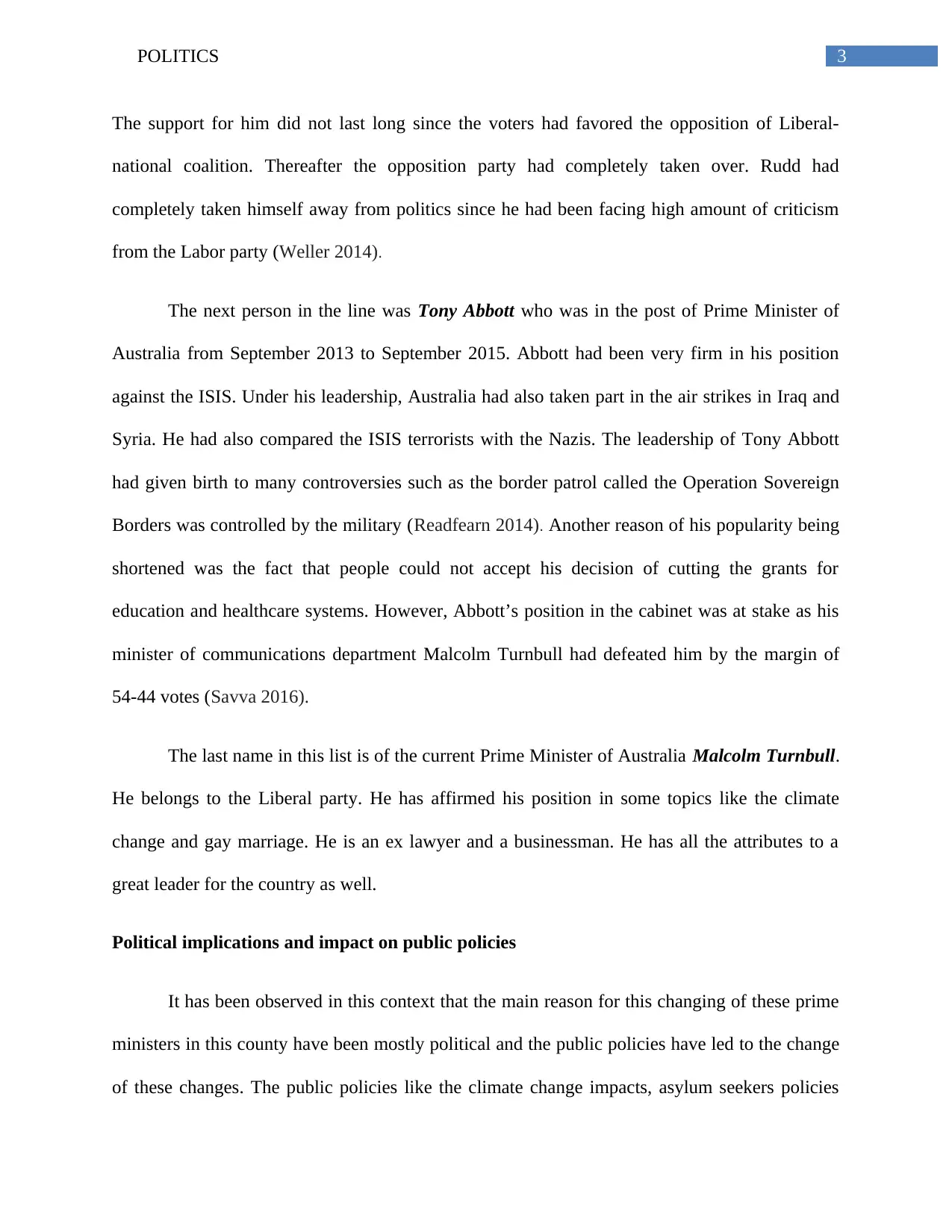
3POLITICS
The support for him did not last long since the voters had favored the opposition of Liberal-
national coalition. Thereafter the opposition party had completely taken over. Rudd had
completely taken himself away from politics since he had been facing high amount of criticism
from the Labor party (Weller 2014).
The next person in the line was Tony Abbott who was in the post of Prime Minister of
Australia from September 2013 to September 2015. Abbott had been very firm in his position
against the ISIS. Under his leadership, Australia had also taken part in the air strikes in Iraq and
Syria. He had also compared the ISIS terrorists with the Nazis. The leadership of Tony Abbott
had given birth to many controversies such as the border patrol called the Operation Sovereign
Borders was controlled by the military (Readfearn 2014). Another reason of his popularity being
shortened was the fact that people could not accept his decision of cutting the grants for
education and healthcare systems. However, Abbott’s position in the cabinet was at stake as his
minister of communications department Malcolm Turnbull had defeated him by the margin of
54-44 votes (Savva 2016).
The last name in this list is of the current Prime Minister of Australia Malcolm Turnbull.
He belongs to the Liberal party. He has affirmed his position in some topics like the climate
change and gay marriage. He is an ex lawyer and a businessman. He has all the attributes to a
great leader for the country as well.
Political implications and impact on public policies
It has been observed in this context that the main reason for this changing of these prime
ministers in this county have been mostly political and the public policies have led to the change
of these changes. The public policies like the climate change impacts, asylum seekers policies
The support for him did not last long since the voters had favored the opposition of Liberal-
national coalition. Thereafter the opposition party had completely taken over. Rudd had
completely taken himself away from politics since he had been facing high amount of criticism
from the Labor party (Weller 2014).
The next person in the line was Tony Abbott who was in the post of Prime Minister of
Australia from September 2013 to September 2015. Abbott had been very firm in his position
against the ISIS. Under his leadership, Australia had also taken part in the air strikes in Iraq and
Syria. He had also compared the ISIS terrorists with the Nazis. The leadership of Tony Abbott
had given birth to many controversies such as the border patrol called the Operation Sovereign
Borders was controlled by the military (Readfearn 2014). Another reason of his popularity being
shortened was the fact that people could not accept his decision of cutting the grants for
education and healthcare systems. However, Abbott’s position in the cabinet was at stake as his
minister of communications department Malcolm Turnbull had defeated him by the margin of
54-44 votes (Savva 2016).
The last name in this list is of the current Prime Minister of Australia Malcolm Turnbull.
He belongs to the Liberal party. He has affirmed his position in some topics like the climate
change and gay marriage. He is an ex lawyer and a businessman. He has all the attributes to a
great leader for the country as well.
Political implications and impact on public policies
It has been observed in this context that the main reason for this changing of these prime
ministers in this county have been mostly political and the public policies have led to the change
of these changes. The public policies like the climate change impacts, asylum seekers policies
Paraphrase This Document
Need a fresh take? Get an instant paraphrase of this document with our AI Paraphraser
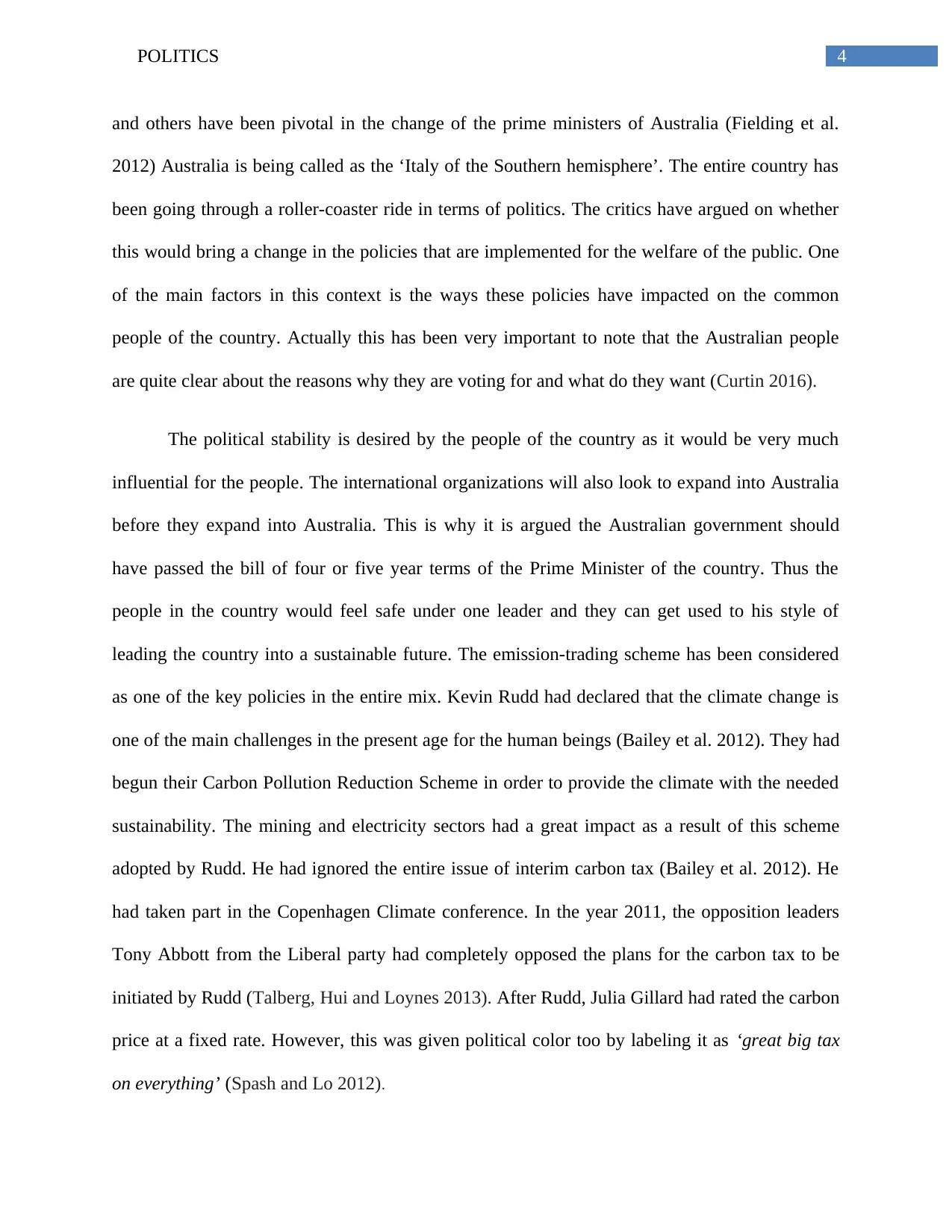
4POLITICS
and others have been pivotal in the change of the prime ministers of Australia (Fielding et al.
2012) Australia is being called as the ‘Italy of the Southern hemisphere’. The entire country has
been going through a roller-coaster ride in terms of politics. The critics have argued on whether
this would bring a change in the policies that are implemented for the welfare of the public. One
of the main factors in this context is the ways these policies have impacted on the common
people of the country. Actually this has been very important to note that the Australian people
are quite clear about the reasons why they are voting for and what do they want (Curtin 2016).
The political stability is desired by the people of the country as it would be very much
influential for the people. The international organizations will also look to expand into Australia
before they expand into Australia. This is why it is argued the Australian government should
have passed the bill of four or five year terms of the Prime Minister of the country. Thus the
people in the country would feel safe under one leader and they can get used to his style of
leading the country into a sustainable future. The emission-trading scheme has been considered
as one of the key policies in the entire mix. Kevin Rudd had declared that the climate change is
one of the main challenges in the present age for the human beings (Bailey et al. 2012). They had
begun their Carbon Pollution Reduction Scheme in order to provide the climate with the needed
sustainability. The mining and electricity sectors had a great impact as a result of this scheme
adopted by Rudd. He had ignored the entire issue of interim carbon tax (Bailey et al. 2012). He
had taken part in the Copenhagen Climate conference. In the year 2011, the opposition leaders
Tony Abbott from the Liberal party had completely opposed the plans for the carbon tax to be
initiated by Rudd (Talberg, Hui and Loynes 2013). After Rudd, Julia Gillard had rated the carbon
price at a fixed rate. However, this was given political color too by labeling it as ‘great big tax
on everything’ (Spash and Lo 2012).
and others have been pivotal in the change of the prime ministers of Australia (Fielding et al.
2012) Australia is being called as the ‘Italy of the Southern hemisphere’. The entire country has
been going through a roller-coaster ride in terms of politics. The critics have argued on whether
this would bring a change in the policies that are implemented for the welfare of the public. One
of the main factors in this context is the ways these policies have impacted on the common
people of the country. Actually this has been very important to note that the Australian people
are quite clear about the reasons why they are voting for and what do they want (Curtin 2016).
The political stability is desired by the people of the country as it would be very much
influential for the people. The international organizations will also look to expand into Australia
before they expand into Australia. This is why it is argued the Australian government should
have passed the bill of four or five year terms of the Prime Minister of the country. Thus the
people in the country would feel safe under one leader and they can get used to his style of
leading the country into a sustainable future. The emission-trading scheme has been considered
as one of the key policies in the entire mix. Kevin Rudd had declared that the climate change is
one of the main challenges in the present age for the human beings (Bailey et al. 2012). They had
begun their Carbon Pollution Reduction Scheme in order to provide the climate with the needed
sustainability. The mining and electricity sectors had a great impact as a result of this scheme
adopted by Rudd. He had ignored the entire issue of interim carbon tax (Bailey et al. 2012). He
had taken part in the Copenhagen Climate conference. In the year 2011, the opposition leaders
Tony Abbott from the Liberal party had completely opposed the plans for the carbon tax to be
initiated by Rudd (Talberg, Hui and Loynes 2013). After Rudd, Julia Gillard had rated the carbon
price at a fixed rate. However, this was given political color too by labeling it as ‘great big tax
on everything’ (Spash and Lo 2012).
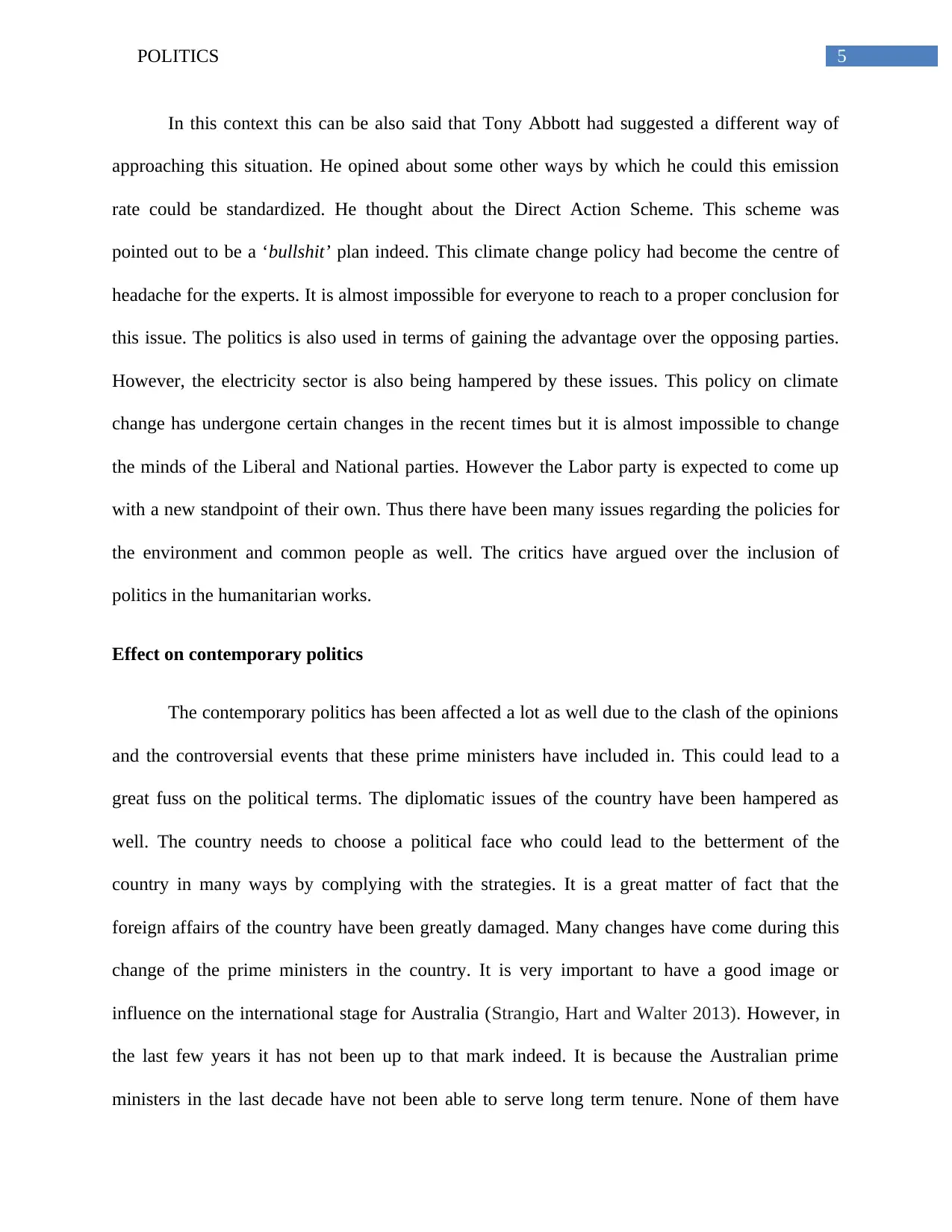
5POLITICS
In this context this can be also said that Tony Abbott had suggested a different way of
approaching this situation. He opined about some other ways by which he could this emission
rate could be standardized. He thought about the Direct Action Scheme. This scheme was
pointed out to be a ‘bullshit’ plan indeed. This climate change policy had become the centre of
headache for the experts. It is almost impossible for everyone to reach to a proper conclusion for
this issue. The politics is also used in terms of gaining the advantage over the opposing parties.
However, the electricity sector is also being hampered by these issues. This policy on climate
change has undergone certain changes in the recent times but it is almost impossible to change
the minds of the Liberal and National parties. However the Labor party is expected to come up
with a new standpoint of their own. Thus there have been many issues regarding the policies for
the environment and common people as well. The critics have argued over the inclusion of
politics in the humanitarian works.
Effect on contemporary politics
The contemporary politics has been affected a lot as well due to the clash of the opinions
and the controversial events that these prime ministers have included in. This could lead to a
great fuss on the political terms. The diplomatic issues of the country have been hampered as
well. The country needs to choose a political face who could lead to the betterment of the
country in many ways by complying with the strategies. It is a great matter of fact that the
foreign affairs of the country have been greatly damaged. Many changes have come during this
change of the prime ministers in the country. It is very important to have a good image or
influence on the international stage for Australia (Strangio, Hart and Walter 2013). However, in
the last few years it has not been up to that mark indeed. It is because the Australian prime
ministers in the last decade have not been able to serve long term tenure. None of them have
In this context this can be also said that Tony Abbott had suggested a different way of
approaching this situation. He opined about some other ways by which he could this emission
rate could be standardized. He thought about the Direct Action Scheme. This scheme was
pointed out to be a ‘bullshit’ plan indeed. This climate change policy had become the centre of
headache for the experts. It is almost impossible for everyone to reach to a proper conclusion for
this issue. The politics is also used in terms of gaining the advantage over the opposing parties.
However, the electricity sector is also being hampered by these issues. This policy on climate
change has undergone certain changes in the recent times but it is almost impossible to change
the minds of the Liberal and National parties. However the Labor party is expected to come up
with a new standpoint of their own. Thus there have been many issues regarding the policies for
the environment and common people as well. The critics have argued over the inclusion of
politics in the humanitarian works.
Effect on contemporary politics
The contemporary politics has been affected a lot as well due to the clash of the opinions
and the controversial events that these prime ministers have included in. This could lead to a
great fuss on the political terms. The diplomatic issues of the country have been hampered as
well. The country needs to choose a political face who could lead to the betterment of the
country in many ways by complying with the strategies. It is a great matter of fact that the
foreign affairs of the country have been greatly damaged. Many changes have come during this
change of the prime ministers in the country. It is very important to have a good image or
influence on the international stage for Australia (Strangio, Hart and Walter 2013). However, in
the last few years it has not been up to that mark indeed. It is because the Australian prime
ministers in the last decade have not been able to serve long term tenure. None of them have
⊘ This is a preview!⊘
Do you want full access?
Subscribe today to unlock all pages.

Trusted by 1+ million students worldwide
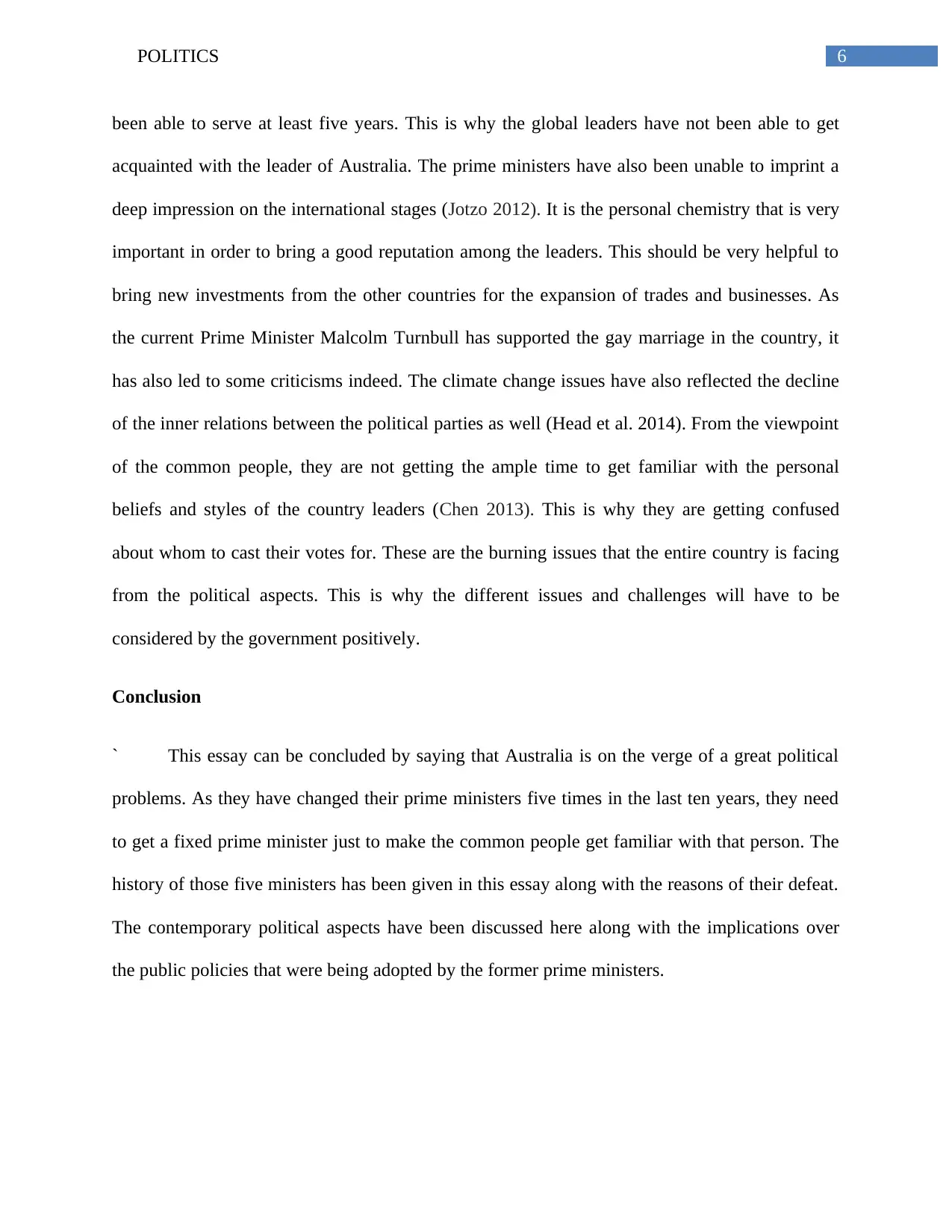
6POLITICS
been able to serve at least five years. This is why the global leaders have not been able to get
acquainted with the leader of Australia. The prime ministers have also been unable to imprint a
deep impression on the international stages (Jotzo 2012). It is the personal chemistry that is very
important in order to bring a good reputation among the leaders. This should be very helpful to
bring new investments from the other countries for the expansion of trades and businesses. As
the current Prime Minister Malcolm Turnbull has supported the gay marriage in the country, it
has also led to some criticisms indeed. The climate change issues have also reflected the decline
of the inner relations between the political parties as well (Head et al. 2014). From the viewpoint
of the common people, they are not getting the ample time to get familiar with the personal
beliefs and styles of the country leaders (Chen 2013). This is why they are getting confused
about whom to cast their votes for. These are the burning issues that the entire country is facing
from the political aspects. This is why the different issues and challenges will have to be
considered by the government positively.
Conclusion
` This essay can be concluded by saying that Australia is on the verge of a great political
problems. As they have changed their prime ministers five times in the last ten years, they need
to get a fixed prime minister just to make the common people get familiar with that person. The
history of those five ministers has been given in this essay along with the reasons of their defeat.
The contemporary political aspects have been discussed here along with the implications over
the public policies that were being adopted by the former prime ministers.
been able to serve at least five years. This is why the global leaders have not been able to get
acquainted with the leader of Australia. The prime ministers have also been unable to imprint a
deep impression on the international stages (Jotzo 2012). It is the personal chemistry that is very
important in order to bring a good reputation among the leaders. This should be very helpful to
bring new investments from the other countries for the expansion of trades and businesses. As
the current Prime Minister Malcolm Turnbull has supported the gay marriage in the country, it
has also led to some criticisms indeed. The climate change issues have also reflected the decline
of the inner relations between the political parties as well (Head et al. 2014). From the viewpoint
of the common people, they are not getting the ample time to get familiar with the personal
beliefs and styles of the country leaders (Chen 2013). This is why they are getting confused
about whom to cast their votes for. These are the burning issues that the entire country is facing
from the political aspects. This is why the different issues and challenges will have to be
considered by the government positively.
Conclusion
` This essay can be concluded by saying that Australia is on the verge of a great political
problems. As they have changed their prime ministers five times in the last ten years, they need
to get a fixed prime minister just to make the common people get familiar with that person. The
history of those five ministers has been given in this essay along with the reasons of their defeat.
The contemporary political aspects have been discussed here along with the implications over
the public policies that were being adopted by the former prime ministers.
Paraphrase This Document
Need a fresh take? Get an instant paraphrase of this document with our AI Paraphraser
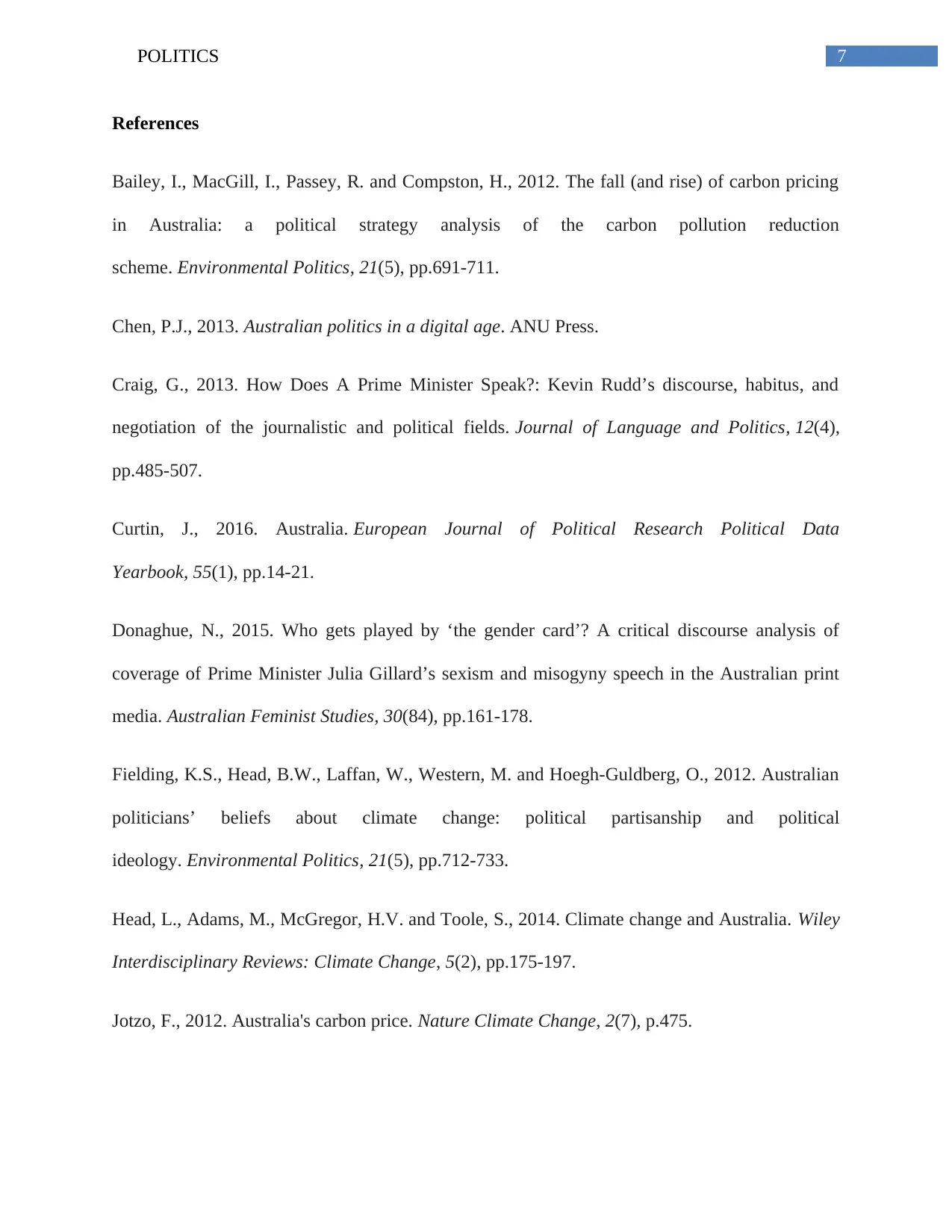
7POLITICS
References
Bailey, I., MacGill, I., Passey, R. and Compston, H., 2012. The fall (and rise) of carbon pricing
in Australia: a political strategy analysis of the carbon pollution reduction
scheme. Environmental Politics, 21(5), pp.691-711.
Chen, P.J., 2013. Australian politics in a digital age. ANU Press.
Craig, G., 2013. How Does A Prime Minister Speak?: Kevin Rudd’s discourse, habitus, and
negotiation of the journalistic and political fields. Journal of Language and Politics, 12(4),
pp.485-507.
Curtin, J., 2016. Australia. European Journal of Political Research Political Data
Yearbook, 55(1), pp.14-21.
Donaghue, N., 2015. Who gets played by ‘the gender card’? A critical discourse analysis of
coverage of Prime Minister Julia Gillard’s sexism and misogyny speech in the Australian print
media. Australian Feminist Studies, 30(84), pp.161-178.
Fielding, K.S., Head, B.W., Laffan, W., Western, M. and Hoegh-Guldberg, O., 2012. Australian
politicians’ beliefs about climate change: political partisanship and political
ideology. Environmental Politics, 21(5), pp.712-733.
Head, L., Adams, M., McGregor, H.V. and Toole, S., 2014. Climate change and Australia. Wiley
Interdisciplinary Reviews: Climate Change, 5(2), pp.175-197.
Jotzo, F., 2012. Australia's carbon price. Nature Climate Change, 2(7), p.475.
References
Bailey, I., MacGill, I., Passey, R. and Compston, H., 2012. The fall (and rise) of carbon pricing
in Australia: a political strategy analysis of the carbon pollution reduction
scheme. Environmental Politics, 21(5), pp.691-711.
Chen, P.J., 2013. Australian politics in a digital age. ANU Press.
Craig, G., 2013. How Does A Prime Minister Speak?: Kevin Rudd’s discourse, habitus, and
negotiation of the journalistic and political fields. Journal of Language and Politics, 12(4),
pp.485-507.
Curtin, J., 2016. Australia. European Journal of Political Research Political Data
Yearbook, 55(1), pp.14-21.
Donaghue, N., 2015. Who gets played by ‘the gender card’? A critical discourse analysis of
coverage of Prime Minister Julia Gillard’s sexism and misogyny speech in the Australian print
media. Australian Feminist Studies, 30(84), pp.161-178.
Fielding, K.S., Head, B.W., Laffan, W., Western, M. and Hoegh-Guldberg, O., 2012. Australian
politicians’ beliefs about climate change: political partisanship and political
ideology. Environmental Politics, 21(5), pp.712-733.
Head, L., Adams, M., McGregor, H.V. and Toole, S., 2014. Climate change and Australia. Wiley
Interdisciplinary Reviews: Climate Change, 5(2), pp.175-197.
Jotzo, F., 2012. Australia's carbon price. Nature Climate Change, 2(7), p.475.
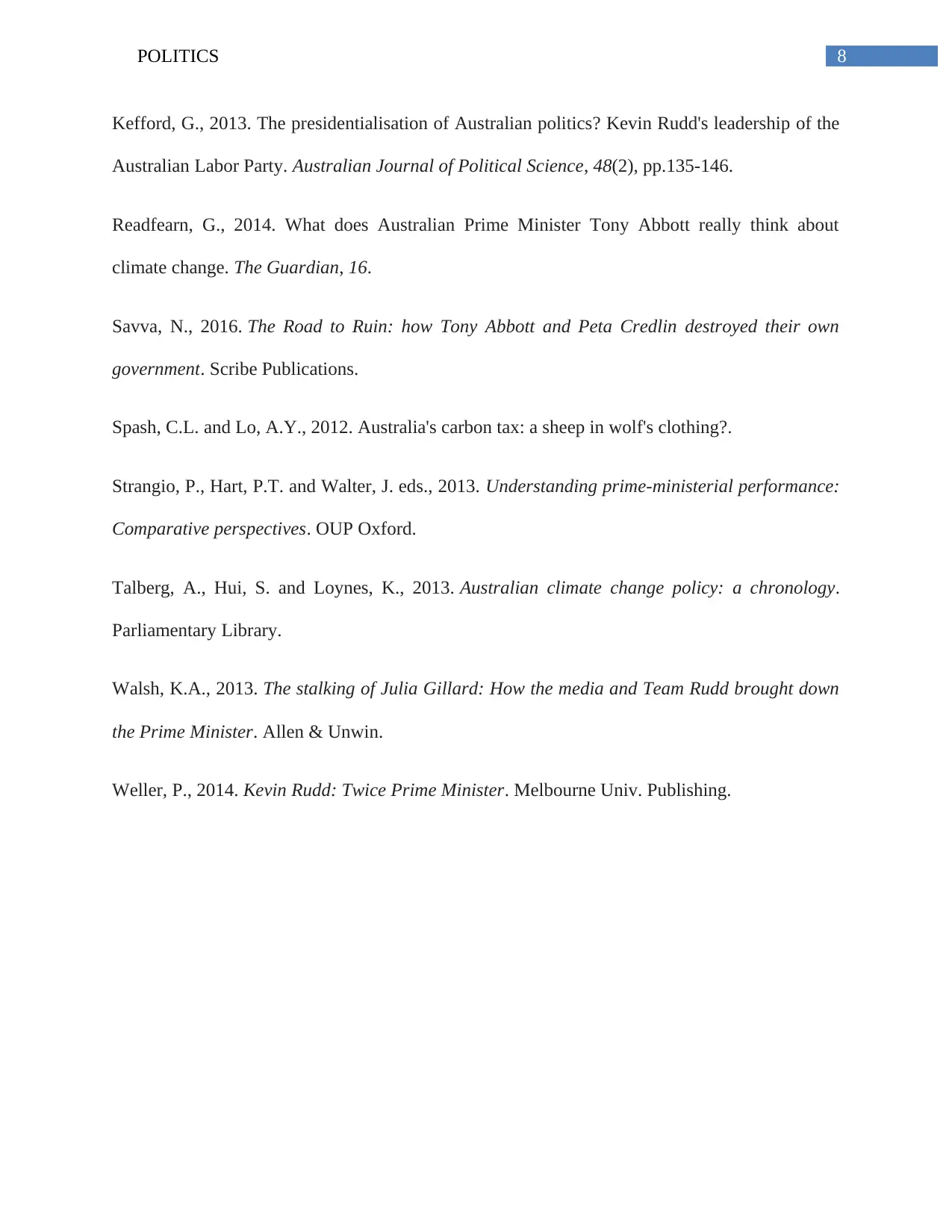
8POLITICS
Kefford, G., 2013. The presidentialisation of Australian politics? Kevin Rudd's leadership of the
Australian Labor Party. Australian Journal of Political Science, 48(2), pp.135-146.
Readfearn, G., 2014. What does Australian Prime Minister Tony Abbott really think about
climate change. The Guardian, 16.
Savva, N., 2016. The Road to Ruin: how Tony Abbott and Peta Credlin destroyed their own
government. Scribe Publications.
Spash, C.L. and Lo, A.Y., 2012. Australia's carbon tax: a sheep in wolf's clothing?.
Strangio, P., Hart, P.T. and Walter, J. eds., 2013. Understanding prime-ministerial performance:
Comparative perspectives. OUP Oxford.
Talberg, A., Hui, S. and Loynes, K., 2013. Australian climate change policy: a chronology.
Parliamentary Library.
Walsh, K.A., 2013. The stalking of Julia Gillard: How the media and Team Rudd brought down
the Prime Minister. Allen & Unwin.
Weller, P., 2014. Kevin Rudd: Twice Prime Minister. Melbourne Univ. Publishing.
Kefford, G., 2013. The presidentialisation of Australian politics? Kevin Rudd's leadership of the
Australian Labor Party. Australian Journal of Political Science, 48(2), pp.135-146.
Readfearn, G., 2014. What does Australian Prime Minister Tony Abbott really think about
climate change. The Guardian, 16.
Savva, N., 2016. The Road to Ruin: how Tony Abbott and Peta Credlin destroyed their own
government. Scribe Publications.
Spash, C.L. and Lo, A.Y., 2012. Australia's carbon tax: a sheep in wolf's clothing?.
Strangio, P., Hart, P.T. and Walter, J. eds., 2013. Understanding prime-ministerial performance:
Comparative perspectives. OUP Oxford.
Talberg, A., Hui, S. and Loynes, K., 2013. Australian climate change policy: a chronology.
Parliamentary Library.
Walsh, K.A., 2013. The stalking of Julia Gillard: How the media and Team Rudd brought down
the Prime Minister. Allen & Unwin.
Weller, P., 2014. Kevin Rudd: Twice Prime Minister. Melbourne Univ. Publishing.
⊘ This is a preview!⊘
Do you want full access?
Subscribe today to unlock all pages.

Trusted by 1+ million students worldwide
1 out of 9
Related Documents
Your All-in-One AI-Powered Toolkit for Academic Success.
+13062052269
info@desklib.com
Available 24*7 on WhatsApp / Email
![[object Object]](/_next/static/media/star-bottom.7253800d.svg)
Unlock your academic potential
Copyright © 2020–2026 A2Z Services. All Rights Reserved. Developed and managed by ZUCOL.





